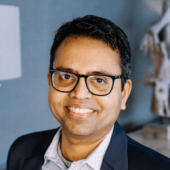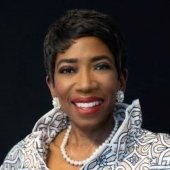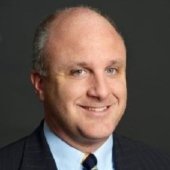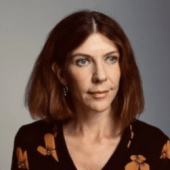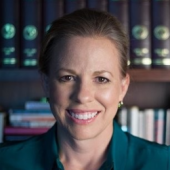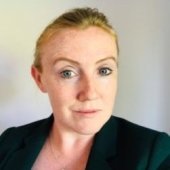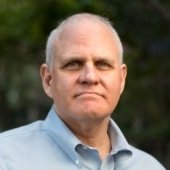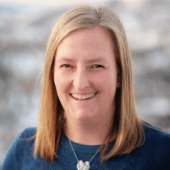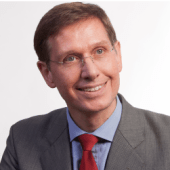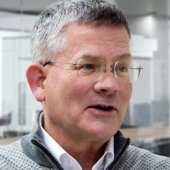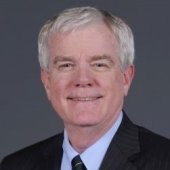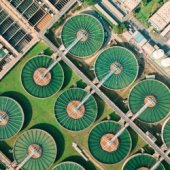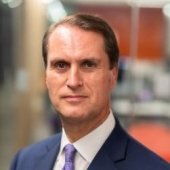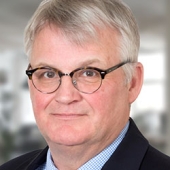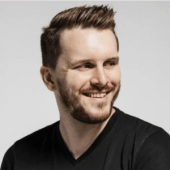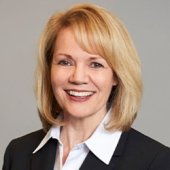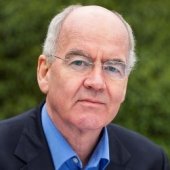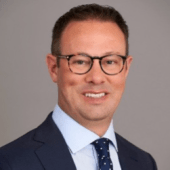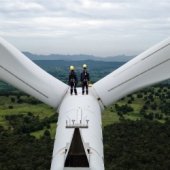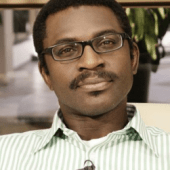IN BRIEF
- 6:23 - About 84% of our packaging is now recyclable or designed for recycling or proposed for reusable. Another 84% number there because we have reached it now, 84% of renewable electricity for all the electricity that we source ourselves across the world.
- 14:43 - Combining social justice, environmental protection, and return on investment, this triple bottom line, that’s how we address sustainability.
- 17:46 - First and foremost, you have to have someone in your organization who is spending enough time to think about sustainability, who is empowered to not only hear your external stakeholders, but also interact with your internal stakeholders and start deciding what are the key elements to be the priority focus.
Mario Abreu is Global Head of Corporate Social Responsibility and Sustainability for the Ferrero Group, an Italian multinational manufacturer of branded chocolate and confectionery products. Its brands include Nutella, Kinder, Ferrero Pralines, and the breath mints Tic Tac, among others. In the VISION by Protiviti interview, Joe Kornik, Editor-in-Chief of VISION by Protiviti, sits down with Abreu to discuss his role, the firm’s corporate social responsibility efforts and vision for the future, as well as why Ferrero doesn’t use the term “ESG” when it discusses sustainable business. Links to the firm's annual sustainability reports can be accessed in the transcript below.
Video transcript
Joe Kornik: Welcome to the VISION by Protiviti Interview. I’m Joe Kornik, Editor-in-Chief of VISION by Protiviti, our global content resource looking into the future to examine the big themes that will impact the C-suite and executive boardrooms worldwide. Today, we’re exploring the future of ESG and its strategic implications, and I’m happy to welcome Mario Abreu to the program. Mario is Global Head of Corporate Social Responsibility and Sustainability for the Ferrero Group, an Italian multinational manufacturer of branded chocolate and confectionary products. Its brands include Nutella, Kinder, Ferrero Pralines, and the breath mint Tic Tac. I can tell you we’ve got at least two of those products in our house right now.
Mario, thank you so much for joining me today.
Mario Abreu: Thank you very much for inviting me, Joe. Happy to be here.
Joe Kornik: Mario, you’re head of Corporate Social Responsibility and Sustainability for the Ferrero Group. Talk to me, if you could, a little bit about your role there, both day-to-day and where you’re focused for the future.
Mario Abreu: Absolutely. Yes. This role of head of CSR and Sustainability here is relatively new. It was shaped about three years ago. The idea was really to bring sustainability up in front into the strategy of the group. I report into the Chief Strategy Officer under the staff of the executive chairman, and the responsibility here really is to set up the long-term direction for the company. As I’m joined by a team with me, I work very much in collaboration with the rest of the organization that has more of a mandate to implement.
In my role, most of my day is about external engagements. We need to understand what is happening around the world, what the external stakeholders are expecting, what are the new trends, what are the latest in science that we need to be aware about. Combining that with internal collaboration because, as we set out a long-term direction, a long-term strategy for the group, it is important to collaborate and support my colleagues who are, on the day-to-day, driving the activities, driving the projects that really make the positive effect that we are looking for.
Joe Kornik: I know a lot of our viewers are probably familiar with the brands that I mentioned in our intro. Tell me a little bit about Ferrero Group, the company, in terms of its global reach and its size and its scope.
Mario Abreu: Yes. Ferrero has been a growing business. We have done a lot of organic growth since the beginning of the company in its origin in Alba, in the north of Italy. In the past few years, we have also acquired a few new businesses so that allowed us to expand from what was mainly an European-based operation and outreach into having a much larger footprint today, for instance, in North America, but also growing in Asia and some other markets. We are more than 35,000 people right now in the company. We have many brands. Besides the ones you have mentioned before, we have acquired or developed a few other ones like Butterfinger and a few other companies that we have acquired, for instance outside the more traditional chocolate business in regards to cereal bars like Eat Natural. The company is expanding, and this is one of the very interesting things of the job, as well, is to bring in new companies, understand where they are in their, let’s call it, sustainability journey and help them convert towards the path that we have been setting here.
Joe Kornik: Right. Especially, as you grow, I know Ferrero takes sustainability very seriously. I know it’s a big part of your company’s culture. I was taking a look at your annual sustainability report that you have published on your website, and we can put a link to that in the video. I know that sustainability report measures everything from environment and how you source ingredients to responsible consumption and empowering your people. Can you walk me through some of the highlights of that report because I think it’s a really interesting look at the company?
Mario Abreu: Yes, absolutely. As you said, we try to put our information available there on an annual basis in the sustainability report. We have been doing even a bit more than that. We have been publishing on our sustainability website, ferrerosustainability.com. We have been publishing a lot of other documents as well that we believe stakeholders are interested to see. For the report, as you said, we have now a history of publishing some of these reports. We are more of the type of company that talks about the work then walks the talk. We try to avoid over or under promising, and we try to focus on delivering and reporting transparently on things that we have achieved.
We have, for instance, this year reached a very important number for us which is regarding sustainability of cocoa. 100% of all of the cocoa resource is now sourced through independent programs. We maintain our palm oil certification for 100% of the palm oil resource. All of our volumes are segregated and certified according to their own table of sustainable palm oil. We are progressing in terms of packaging. About 84% of our packaging is now recyclable or designed for recycling or proposed for reusable. Another 84% number there because we have reached it now, 84% of renewable electricity for all the electricity that we source ourselves across the world. We have a number of initiatives in regard to our own staff. We report the total amount of hours, for instance, that we have in regard to training which is consistently growing as well.
We try to be as broad as possible in regard to the report, looking at the four pillars of our sustainability approach today. I hope the reporting is interesting for the readers. We know it is still a long report. It’s almost 100 pages, and we would like to make it more precise. At the same time, there is a lot there. There is a lot of information there. We try to also bring in some case studies. We have very interesting collaborations ongoing on the ground in Turkey to protect human rights for hazelnut farmers. In Ivory Coast and Ghana, also in regard to protection of human rights for the farmers, the small holders, who source a lot of the cocoa we consume in our plants. All of this makes it for a long report, but I hope an interesting one anyhow.
Joe Kornik: No, it is, absolutely. I spent some time with it, and it is thorough and it is long, but it’s really interesting. A lot of that report focuses on the progress that the company has made or is making. But some of it also is a vision statement on where the company is going or wants to go. Can you talk a little bit about some of Ferrero’s goals for, let’s say, 2030 and beyond?
Mario Abreu: Yes, sure. Joe, as I mentioned, we like to talk about what we have been doing and avoid promising too much, but one of the responsibilities that I had right in here was to start setting these ambitions towards 2030, right? One of the first things we did was to get our climate goal, approve it by the Science-Based Target Initiative. We have aligned our emissions in terms of Scope I, 2, and 3 through the IPCC curves according to the recommendations of SBTI. We have a target for reducing our carbon footprint of all the energy we produced, all the electricity we buy by 50% between 2018 and 2030 despite growth, and we are growing at a reasonable pace. That requires not only that we go for a renewable electricity, but also that we produce energy ourselves with the lowest possible carbon footprint.
We have goals for packaging for 2025. We have goals for sourcing cocoa, hazelnut, palm oil, sugar for 2025 as well. Now, what we’re trying to do in regard to 2030, and the longer perhaps horizon there, is to use some of the ambitions we have now been able to put in place for 2030 and use that as some kind of backcasting. If we have a vision of where we want to be in 2030, and we take account of where we are today, then we start influencing what the next two years will give. With that, we’ll reach 2025 for which we have already some goals as I mentioned, packaging materials, et cetera. That already starts to give us an opportunity to think about what are the next steps beyond 2025 that we’re going to have to implement to be able to reach the ambitions for 2030. Because at the end of the day, as we see with climate change, the conversation has been mostly to reduce emissions, mitigate emissions.
Now, we see that climate change is all over. We see that on a daily basis. Then we have to continue working on mitigation and we have to continue working to minimize and avoid emissions as much as possible, but we also have to increase the resilience of the business to adapt to the changes that we cannot avoid anymore. That, for me, is one of the key important parts of being able to look into the future. It’s to be able to increase the resilience of our business, and not only about making promises. It is about ensuring that whatever comes our way in the next five, 10, 15 years, we’re going to be ready to continue developing the business in a sustainable way from a perspective of profit generation, of providing environmental protection, and creating social justice. If we don’t do all of these at the same time, we know we’re not going to be successful.
Joe Kornik: Right. No better lessons certainly than what we’ve gone through the last few years in terms of not knowing what’s around the corner or what the future may hold and being resilient. A lot of what you discussed sounds like ESG. That’s where we’re focused on with this content initiative, the future of ESG. I know Ferrero prefers to focus on sustainability and corporate social responsibility rather than ESG. I’m just curious as to your thoughts, why is that?
Mario Abreu: Joe, very interesting question. I think for most of laymen, it might not make any difference. At the end of the day, it’s all about sustainability. I think ESG has become a bit more, should I say, fashionable in the past few years because the investors have really started to be quite conscious about the impact of sustainability on return on investment of businesses because of risk, because of unwanted consequences of business practices. I think that it’s great that if companies have not been looking at a more science-based, human, people-based sustainability, that now they are addressing sustainability indicators or attributes to reduce the risk for investors, so that is good.
For Ferrero, what has been working really well is we come from a heritage of, as you said, corporate social responsibility, which, looking back over time, fits very well with the intention of a family-owned business. We’re still privately-held. From the early days, the founding fathers of this company, they always believed that they needed to give something back to society. Giving back to society, whether we call it philanthropy or corporate social responsibility, is a good thing. It’s about making sure that you are supporting, where you work, the people that work with you, the people that are in your supply chain to be able to give something back.
Now, as we start talking about resilience, as we already did, we need to make sure that we understand what science tells us as the right way to go, at least, in terms of environmental protection. For that, that’s kind of how we bring the word sustainability. Is this environmental protection based on science? But also on the acknowledgement that without social justice, we cannot be able to leverage on the people we need, on the people that are working in our factories, working for our suppliers, working on the farms and the fields. Combining social justice, environmental protection, and return on investment, this triple bottom line, that’s how we address sustainability.
Joe Kornik: Right. No matter what you call it, I think it’s clear that Ferrero is clearly ahead of the curve when it comes to sustainable business or the business of sustainability, even putting up that annual report that we talked about earlier for 14 years and clearly you’ve been thinking about it longer than that. I guess I’d be curious to hear your opinion how you think other businesses are doing when it comes to sustainability and tie that back to the consumer, right? I mean, this is not just an initiative to do good and do well, which would be great, but there’s a real strategic business reason for sustainable business.
Mario Abreu: Yes, Joe, I believe so. There is a reason and I think more and more businesses are seeing that reason. If you ask how businesses are doing, it’s very open, very difficult question to ask. Nevertheless, I believe that more and more companies are seeing the opportunity to work on sustainability. I still believe there is probably, generalizing a bit, but there are probably two types of approaches. One approach is fixing yourself on one specific attribute and make sure the consumer understands you are very good on it. It takes something like, I don’t know, let’s take carbon. Then all your communication and a lot of your effort is put into your carbon footprint, reducing your carbon footprint, and being good on carbon.
You may not have a 360-degrees approach. You may not be doing right in the number of other important attributes of sustainability, but you focus on that one and you try to get your consumers to recognize you for the efforts you’re making there. There are companies that probably are more mature in the journey, and they try to do everything or, at least, they try to understand what are the main aspects, main attributes that should be part of their strategy, and they go towards a handful, a dozen, whatever, of important attributes that are encompassing of all your business. I think the companies that are looking at one specific attribute, I think at this point in time, they are able to connect with the consumers, but I don’t think they have the full picture of the long-term resilience.
Joe Kornik: Any advice for those businesses that maybe aren’t so far along? What steps could they be taking or what steps could business leaders be taking to set them up for a successful and sustainable future?
Mario Abreu: Yes. I think, first and foremost, you have to have someone in your organization who is spending enough time to think about sustainability, who is empowered to not only hear your external stakeholders, but also interact with your internal stakeholders and start deciding what are the key elements to be the priority focus. You cannot just go from zero to 100 in a couple of seconds. You have to be able to shift your gears as you move forward. You have to be able to understand where are the pressing points, the hotspots. Start listening to your business partners, your consumers, and start creating both the internal—not necessarily the organization, but the internal group of people that will feel empowered, that will feel capable of starting to work on sustainability attributes. Then also start reaching out to consumers or to your end customers and be aware of what is it that they want to get from you. I think everybody has to understand. It’s complex and it’s a journey. I think this is one of the key aspects that we have to keep in mind all the time about sustainability.
Joe Kornik: Thanks, Mario. Last question from me, and it’s bold-prediction time. I’d like to ask you to look out to 2035, let’s say, and predict a couple of things for me. One, where the Ferrero Group would be at that point in time? Two, where do you think we’ll be as a planet? I mean, do you think it’s a better world in 2035? How optimistic are you?
Mario Abreu: Carefully optimistic. I think we have to have a better world in 2035. I don’t think we can afford not to. I mean, if we care about our children and their children, we have to have a better world in 2035. We cannot wait for 2050 to start changing things. We have to start changing things today. Where the Ferrero Group will be, well, hopefully, that’s what we’re here to do, is to guarantee that we will continue to have a reliable supply chain, continue to make products that our consumers are delighted to taste and to savor, and be able to be resilient no matter what will come our way. I think that’s where we’re trying to head, again, to be more resilient in our strategy. I think we know enough about the path that we are taking, and hopefully, Ferrero is going to be, if not stronger, as strong as it is today in 2035.
Joe Kornik: Thank you so much for the time today, Mario. I really appreciate the insight and the look inside the Ferrero Group.
Mario Abreu: Thank you, Joe. Thanks for inviting me. Thanks a lot.
Joe Kornik: Thank you for watching the VISION by Protiviti Interview. I’m Joe Kornik. We’ll see you next time.
Did you enjoy this content? For more like this, subscribe to the VISION by Protiviti newsletter.



